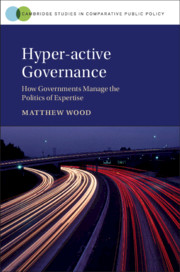Book contents
- Hyper-active Governance
- Cambridge Studies in Comparative Public Policy
- Hyper-active Governance
- Copyright page
- Contents
- Figures
- Tables
- Boxes
- Preface
- Acknowledgements
- Abbreviations
- Part I Introducing Hyper-active Governance
- Part II Hyper-active Governance in Practice
- 3 Defence
- 4 Empowerment
- 5 Inclusion
- 6 Defend, Empower and Include
- Part III Theorising Hyper-active Governance
- Book part
- Notes
- References
- Index
6 - Defend, Empower and Include
Hyper-active Governance in Monetary Policy and Electoral Administration
from Part II - Hyper-active Governance in Practice
Published online by Cambridge University Press: 21 June 2019
- Hyper-active Governance
- Cambridge Studies in Comparative Public Policy
- Hyper-active Governance
- Copyright page
- Contents
- Figures
- Tables
- Boxes
- Preface
- Acknowledgements
- Abbreviations
- Part I Introducing Hyper-active Governance
- Part II Hyper-active Governance in Practice
- 3 Defence
- 4 Empowerment
- 5 Inclusion
- 6 Defend, Empower and Include
- Part III Theorising Hyper-active Governance
- Book part
- Notes
- References
- Index
Summary
This book has examined three case studies of policy areas in which it is possible to observe dynamics of hyper-active governance. In each area, politicians must manage the dual demands of relying upon ‘independent’ experts in delegated agencies – what Alasdair Roberts (2011) called the ‘logic of discipline’ – with a wish to impose democratically legitimated state authority – a ‘logic of democracy’. This tension is constantly managed, and the international analysis of developments in each policy area and process-tracing cases identify the distinctive dynamics in each area. These were summed up in terms of three styles: defence (the protection of expert independence), empowerment (the provision of resources to experts to tackle policy problems) and inclusion (the reform of agencies to include diverse stakeholders and conceptions of expertise). This chapter looks at how these styles can be distinguished more clearly from one another. In particular, it argues that the ‘defence’ style can operate alongside the ‘empowerment’ and ‘inclusion’ styles, both in the institutional design of agencies and how they work in practice.
- Type
- Chapter
- Information
- Hyper-active GovernanceHow Governments Manage the Politics of Expertise, pp. 165 - 190Publisher: Cambridge University PressPrint publication year: 2019



